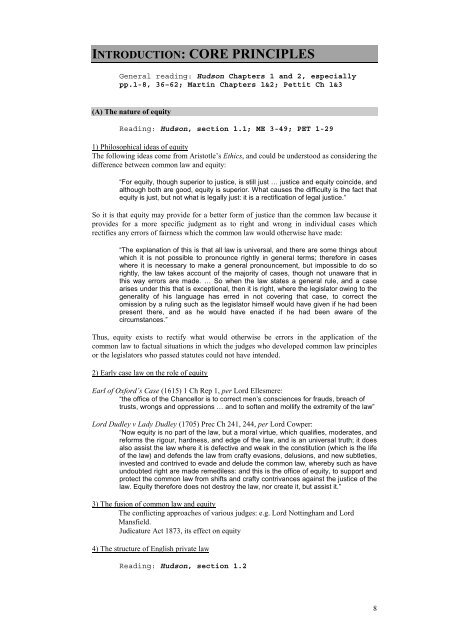Soton Equity and Trusts - alastairhudson.com
Soton Equity and Trusts - alastairhudson.com
Soton Equity and Trusts - alastairhudson.com
You also want an ePaper? Increase the reach of your titles
YUMPU automatically turns print PDFs into web optimized ePapers that Google loves.
INTRODUCTION: CORE PRINCIPLES<br />
General reading: Hudson Chapters 1 <strong>and</strong> 2, especially<br />
pp.1-8, 36–62; Martin Chapters 1&2; Pettit Ch 1&3<br />
(A) The nature of equity<br />
Reading: Hudson, section 1.1; ME 3-49; PET 1-29<br />
1) Philosophical ideas of equity<br />
The following ideas <strong>com</strong>e from Aristotle’s Ethics, <strong>and</strong> could be understood as considering the<br />
difference between <strong>com</strong>mon law <strong>and</strong> equity:<br />
“For equity, though superior to justice, is still just … justice <strong>and</strong> equity coincide, <strong>and</strong><br />
although both are good, equity is superior. What causes the difficulty is the fact that<br />
equity is just, but not what is legally just: it is a rectification of legal justice.”<br />
So it is that equity may provide for a better form of justice than the <strong>com</strong>mon law because it<br />
provides for a more specific judgment as to right <strong>and</strong> wrong in individual cases which<br />
rectifies any errors of fairness which the <strong>com</strong>mon law would otherwise have made:<br />
“The explanation of this is that all law is universal, <strong>and</strong> there are some things about<br />
which it is not possible to pronounce rightly in general terms; therefore in cases<br />
where it is necessary to make a general pronouncement, but impossible to do so<br />
rightly, the law takes account of the majority of cases, though not unaware that in<br />
this way errors are made. … So when the law states a general rule, <strong>and</strong> a case<br />
arises under this that is exceptional, then it is right, where the legislator owing to the<br />
generality of his language has erred in not covering that case, to correct the<br />
omission by a ruling such as the legislator himself would have given if he had been<br />
present there, <strong>and</strong> as he would have enacted if he had been aware of the<br />
circumstances.”<br />
Thus, equity exists to rectify what would otherwise be errors in the application of the<br />
<strong>com</strong>mon law to factual situations in which the judges who developed <strong>com</strong>mon law principles<br />
or the legislators who passed statutes could not have intended.<br />
2) Early case law on the role of equity<br />
Earl of Oxford’s Case (1615) 1 Ch Rep 1, per Lord Ellesmere:<br />
“the office of the Chancellor is to correct men’s consciences for frauds, breach of<br />
trusts, wrongs <strong>and</strong> oppressions … <strong>and</strong> to soften <strong>and</strong> mollify the extremity of the law”<br />
Lord Dudley v Lady Dudley (1705) Prec Ch 241, 244, per Lord Cowper:<br />
“Now equity is no part of the law, but a moral virtue, which qualifies, moderates, <strong>and</strong><br />
reforms the rigour, hardness, <strong>and</strong> edge of the law, <strong>and</strong> is an universal truth; it does<br />
also assist the law where it is defective <strong>and</strong> weak in the constitution (which is the life<br />
of the law) <strong>and</strong> defends the law from crafty evasions, delusions, <strong>and</strong> new subtleties,<br />
invested <strong>and</strong> contrived to evade <strong>and</strong> delude the <strong>com</strong>mon law, whereby such as have<br />
undoubted right are made remediless: <strong>and</strong> this is the office of equity, to support <strong>and</strong><br />
protect the <strong>com</strong>mon law from shifts <strong>and</strong> crafty contrivances against the justice of the<br />
law. <strong>Equity</strong> therefore does not destroy the law, nor create it, but assist it.”<br />
3) The fusion of <strong>com</strong>mon law <strong>and</strong> equity<br />
The conflicting approaches of various judges: e.g. Lord Nottingham <strong>and</strong> Lord<br />
Mansfield.<br />
Judicature Act 1873, its effect on equity<br />
4) The structure of English private law<br />
Reading: Hudson, section 1.2<br />
8













